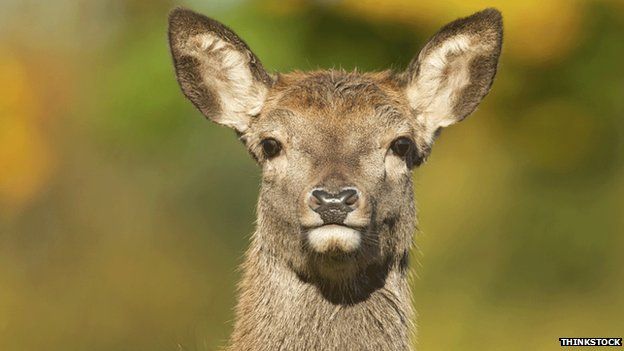Deer DNA used for first time in UK to prosecute poacher
- Published

DNA from a red deer has been used for the first time in the UK to help prosecute a poacher.
James Kennedy, 70, illegally shot and killed and then removed a deer from the Glenfinnan Estate in Lochaber.
He claimed to having shot it lawfully at another location, but scientists matched a blood stain in his van to remains he had left on the estate.
Kennedy was fined £100 and ordered to pay compensation of £70 at Fort William Sheriff Court on Tuesday.
He had earlier pled guilty to killing the deer, gralloching it - removing its internal organs, head and lower legs - and taking the carcass away.
The incident happened near Glenfinnan on 2 February last year.
Police, who had been alerted to a suspected poacher by members of West Lochaber Deer Management Group, stopped Kennedy's van and asked him about the deer carcass in the back of the vehicle.
Because Kennedy said it had been shot at another location with the landowner's consent police had no reason to detain him.
But two days later the head of a red deer hind and other body parts were found at Druim na Brein-choille on Glenfinnan Estate.
Samples of the deer heart and deer hair were taken to the Science and Advice for Scottish Agriculture laboratory in Edinburgh for examination.
A search warrant was later obtained to search Kennedy's van and a blood stain was found on a metal tray in the rear of the van.
SASA scientists working with the University of Edinburgh and Royal Zoological Society of Scotland found a match.
The Crown Office said the probability of these DNA profiles matching by chance alone was one in 40 million.
It said this was first time that DNA profiling has been used to detect deer poaching.
Sara Shaw, a procurator fiscal specialising in wildlife and environment, said the investigation and prosecution had been a joint effort involving SASA, police and specialist prosecutors from the Wildlife and Environmental Crime Unit.
She said: "This conviction represents a highly significant step forward in the fight against wildlife crime.
"Those who flout our wildlife law will be brought to account for their criminal activity."
Ch Insp Colin Gough, Highland and Islands Division wildlife crime co-ordinator at Police Scotland, said: "It is a ground-breaking step forward from a policing perspective to be able to employ new scientific developments to allow cases such as this to be solved.
"Very often, poaching goes unreported and investigations can be complex and pro-longed."